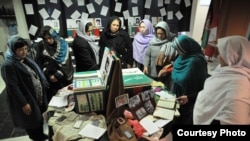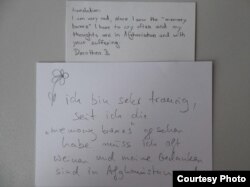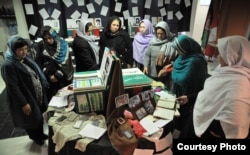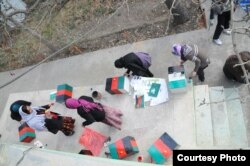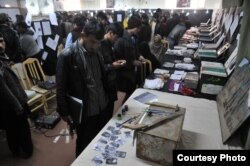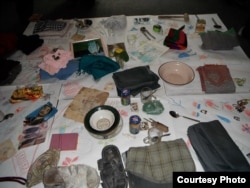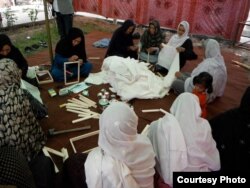Afghanistan Human Rights and Democracy Organization, a Kabul-based rights group, plans to exhibit mementos of war victims in several European countries in coming months.
The group launched the initiative, named Memory Box, in 2011 with the aim of putting a human face on the ongoing violence in Afghanistan.
"We are planning to open exhibitions of the memory boxes in Sweden and Spain in the near future after it was put on display in Germany in June 2018," Muhammad Salim Rajabi, manager of Memory Box initiative, told VOA.
At least three boxes, stuffed with mementos were displayed in Frankfurt, Germany June 1 - 27, where visitors saw the belongings of people killed and injured in Afghanistan.
"The visitors were moved by the stories of the Afghan war victims. Some of them shared their feelings in writing," Rajabi said of the June exhibition in Germany.
Memory boxes
Nearly four decades of war in Afghanistan, beginning with the Soviet Union's 1979, followed by the country's civil war, the Taliban regime and its insurgency in the post 2001 era, has killed, injured and displaced millions of Afghans throughout the country.
Several million Afghans are currently living as refugees in Iran, Pakistan and Europe.
Memory Box is a way to help keep the memory of loved ones alive. Since its launch in 2011, about 300 boxes have been prepared with mementos of war victims.
"Families used to get together to listen to each other's stories, under our "Setam Dedagaan" or [The oppressed ones] project. Later we put our efforts together to turn these personal memories to a more meaningful thing and give the victims and their families the feelings that they are not alone," Rajabi said.
Memory boxes are decorated with the Afghan flag and filled with belongings of the war victims, including clothes, books, shoes, pictures, cups and documents.
The initiative is currently only focused on Kabul, but organizers are planning to expand it to other parts of the country as well.
Each family is asked to write two letters, one for the deceased, and the other for the larger Afghan community, as a way to express their grievances and find a way to heal. The letters are placed in the boxes.
More boxes
As violence continues to claim more lives, organizers are pessimistic about the prospect of peace in the near future and foresee filling more boxes with belongings of victims.
Twenty one militants groups, including Islamic State and the Taliban, are active in the country, according to officials.
From the beginning of 2018 until end of July, violence across the country has killed at least 1,226 people injured 2037 others, according to a survey by Civilian Protection and Advocacy Group, an Afghan watchdog documenting civilian casualties in Afghanistan.
War museum
To find a permanent place for the memory boxes, the Afghan Human Rights and Democracy Organization plans to establish a war museum in the future.
"We have collected 40,000 signatures from families of the victims, civil activists, and government officials. Although the government had agreed to build the museum, the promise has yet to be fulfilled." Rajabi said.
In the meantime, the organization plans to launch an online museum. Work on the virtual museum is in its final stages and will soon launch make the stories of war victims available to anyone with an Internet connection.
"We don't want to let this process and momentum die out. We want to avail every opportunity to keep the hope for transitional justice alive," Rajabi said.
Waiting for justice
In the post-Taliban era, many Afghans hoped that the new government would bring to justice those responsible for the violence. But instead the government adopted a controversial amnesty law shielding from prosecution those who may have committed war crimes.
Human rights advocates say movements like Memory Box may not be able right the wrongs of the past, but they can definitely keep the debate alive.
"At least movements like this demonstrate that people are still waiting for justice to be served, and show that people have no access to justice," Horia Mosadiq, an Afghanistan researcher for Amnesty International, told VOA.
"The most important part is that how these families bear to see that those who committed war crimes are still walking free and even holding official posts," she added.
Some Afghans who lost their family members and relatives haven't lost hope.
Afghani, an Afghan woman in her early 50s, lost almost all male members of her family to war.
"My husband and my father-in-law disappeared after they were taken by Russian puppet regime in 1979. My father-in-law was buried alive. My brother and brother-in-law were also killed. They left me with two of my kids," Afghani told VOA.
Afghani said her wish is that all war criminals are brought to justice, but she is skeptical.
"Who can bring them to court? They are all powerful people," she said.




